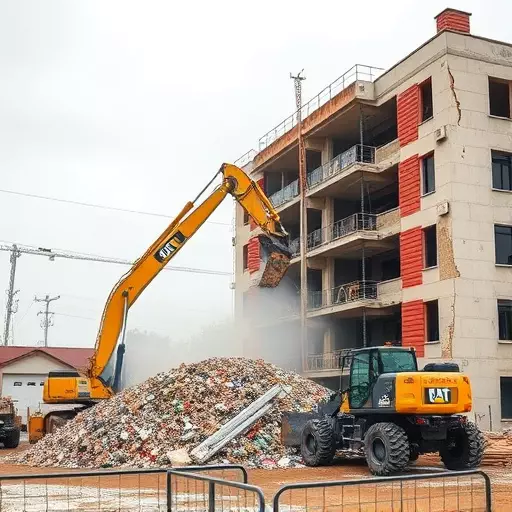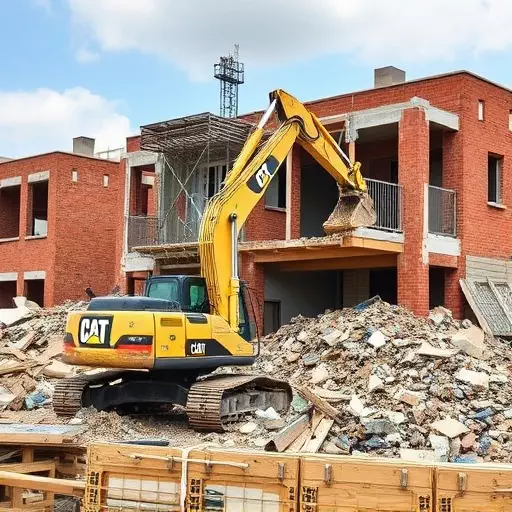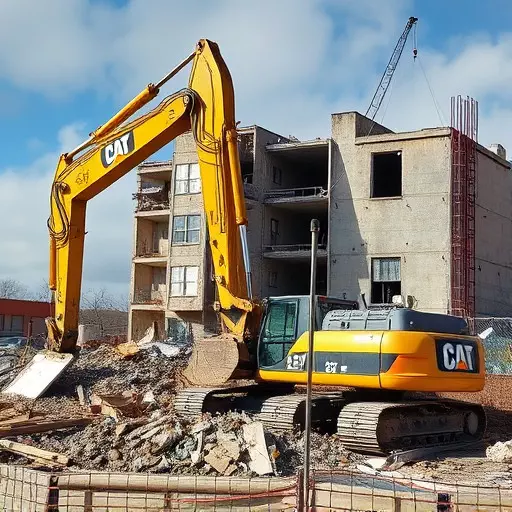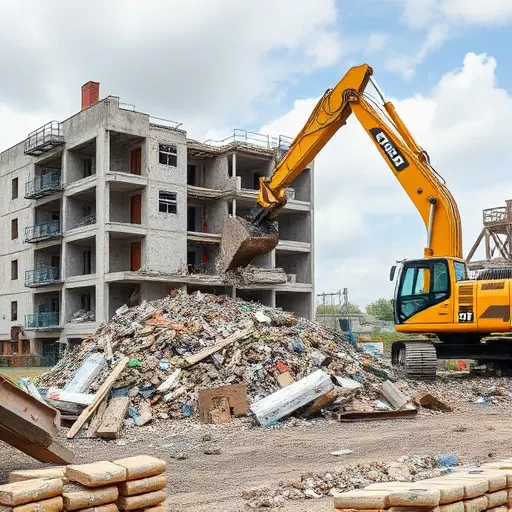Demolition industry regulations in Toledo are vital for ensuring construction site safety, promoting sustainability, and managing hazardous materials. These guidelines cover planning, waste disposal, and material recycling, with a focus on minimal environmental impact and resource recovery through professional demolition and recycling services. Compliance requires navigating permits and licenses from local authorities who demand detailed plans and safety measures. Worker safety is paramount, with strict protocols including training, inspections, and protective gear. Toledo's industry leaders prioritize green initiatives, sorting materials for reuse or responsible disposal to minimize waste and contribute to a circular economy.
“In the dynamic realm of construction and renovation, understanding demolition industry regulations is paramount. This comprehensive guide explores the intricate web of rules governing safe and efficient demolition practices, especially relevant for the vibrant industry in Toledo. From securing permits and licenses for construction site demolition to implementing robust safety protocols and sustainable environmental deconstruction methods, we delve into best practices that ensure compliance without compromising quality. Discover how expert demolition and recycling services can transform projects while adhering to strict industry standards.”
- Understanding Demolition Industry Regulations: An Overview
- Permits and Licenses for Construction Site Demolition
- Safety Protocols: Ensuring Worker Protection on Site
- Environmental Considerations in Building Deconstruction
- Proper Disposal and Recycling of Demolition Waste
- Best Practices for Efficient and Compliant Demolition Services
Understanding Demolition Industry Regulations: An Overview

Demolition industry regulations are vital for ensuring safety, sustainability, and responsible practices in the construction sector, especially when it comes to building deconstruction and construction site demolition. These regulations guide every step of the process, from initial planning to final disposal, with a focus on minimizing environmental impact and maximizing resource recovery through effective demolition and recycling services Toledo.
For instance, strict guidelines are in place to control hazardous materials removal and proper waste classification. This includes identifying and safely handling asbestos, lead, and other toxic substances often found in older buildings. Furthermore, regulations mandate the efficient segregation and recycling of usable materials, such as concrete, steel, and wood, contributing to a circular economy and reducing the demand for new resources in Toledo’s demolition and recycling services.
Permits and Licenses for Construction Site Demolition

In the realm of construction and deconstruction, navigating permits and licenses is a vital step for any project involving building demolition or recycling services toledo. Before initiating construction site demolition, thorough research and application for necessary approvals are imperative. Local authorities typically require detailed plans outlining the scope of work, safety measures, and environmental impact assessments. Permits ensure that the demolition process adheres to regulatory standards, prioritizing worker safety and minimizing ecological disruptions.
When embarking on a building deconstruction project, it’s crucial to coordinate with relevant departments to obtain permits specific to structural disassembly and material removal. These licenses facilitate the legal and efficient execution of construction site demolition, ensuring compliance with environmental and occupational safety regulations. Proper documentation not only protects businesses offering demolition and recycling services toledo but also guarantees projects are conducted smoothly, avoiding potential penalties and delays.
Safety Protocols: Ensuring Worker Protection on Site

In the bustling world of demolition and recycling services Toledo relies on, worker safety is paramount. Before any construction site demolition or building deconstruction begins, rigorous safety protocols must be established and enforced to protect employees from potential hazards. This includes comprehensive training for all personnel, regular inspections of equipment and tools, and clear communication about site risks.
Safety gear, such as hard hats, safety glasses, ear protection, and steel-toed boots, is mandatory on every job site. Additionally, specific protocols are in place for handling hazardous materials, working at heights, and operating heavy machinery to prevent accidents and injuries. Regular stand-down meetings are conducted to revisit safety procedures, ensure understanding, and foster a culture of continuous improvement and awareness among the workforce involved in these essential demolition and deconstruction processes.
Environmental Considerations in Building Deconstruction

In the realm of construction and renovation, environmental considerations play a pivotal role in the sustainable practices of building deconstruction. As a professional in the demolition industry, navigating the intricate landscape of regulations is essential. Specifically, focusing on green initiatives and recycling services Toledo has become a game-changer in the way projects are handled. When it comes to construction site demolition, adopting eco-friendly methods not only minimizes waste but also contributes to a healthier environment.
Delving into building deconstruction allows for the meticulous process of sorting and salvaging materials. This includes separating reusable components from those requiring recycling or responsible disposal. By prioritizing these practices, the industry can reduce its carbon footprint and promote sustainable building practices. Furthermore, with advanced demolition and recycling services Toledo-based companies are able to cater to a diverse range of projects while ensuring compliance with environmental regulations.
Proper Disposal and Recycling of Demolition Waste

The proper disposal and recycling of demolition waste are essential aspects of the construction industry that cannot be overlooked, especially in urban areas like Toledo where space is limited. As buildings are deconstructed or renovated, a significant amount of materials—from concrete and steel to wood and insulation—are generated. Professional demolition and recycling services in Toledo play a vital role in managing this waste responsibly.
These services ensure that construction sites adhere to local regulations by separating and categorizing recyclable materials from non-recyclable ones. Concrete, for instance, can be crushed and reused as aggregate in new constructions, while steel is melted down for future use. Proper disposal methods not only reduce the environmental impact of demolition but also contribute to a more sustainable building landscape, fostering a circular economy where resources are conserved and reused.
Best Practices for Efficient and Compliant Demolition Services

In the realm of demolition and recycling services toledo, adhering to best practices is paramount for efficient and compliant building deconstruction. Navigating construction site demolition requires a strategic approach that balances safety, environmental stewardship, and cost-effectiveness. Professional operators prioritize meticulous planning, utilizing advanced equipment and trained personnel to ensure smooth operations and minimize disruptions on-site.
Implementing sustainable practices, such as sorting and separating materials for recycling, plays a crucial role in reducing the ecological footprint of demolition projects. By adopting these best practices, construction sites can transform into more efficient workspaces, fostering a culture of responsible deconstruction that benefits both the environment and bottom lines.


